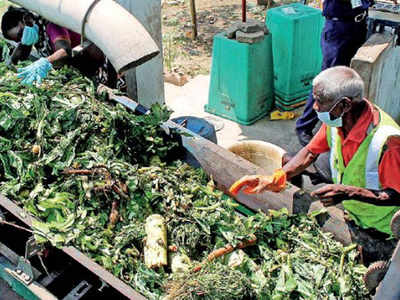The Hindu 18.04.2013
Chennai Corporation seeks proposals from BARC
For installing bio-methanation plants to produce energy from waste.
Chennai Corporation has sought proposals from the
Mumbai-based Bhaba Atomic Research Centre (BARC) for installing and
implementing bio-methanation plants for production of energy from
biodegradable wastes as pilot plants in three places, according to J.
Daniel Chellappa, Senior Scientist, Technical Coordination Wing, BARC,
Chennai.
He was talking to
The Hindu
on the sidelines of PRAGYAN 2013, a national-level technical symposium
organised by the Science and Humanities Association of the Thanthai
Periyar Government Institute of Technology (TPGIT) on the TPGIT campus
here on Wednesday. Mr. Chellappa said that ever since the BARC developed
and implemented the bio-methanation technology for conversion of
biodegradable wastes into energy and achieving scientific solid waste
management (SWM) in the BARC Residential Township in Mumbai in 2002, it
has transferred the technology to 100 companies and the technology is
being used successfully in 150 places throughout the country.
The
places where the technology is being used included government offices
such as the Delhi Secretariat, local bodies and educational
institutions.
Earlier inaugurating the symposium, Mr.
Chellappa said that one could get two cylinders of biogas from one
tonne of biodegradable garbage, while each tonne of garbage produces 50
kg of natural manure.
The Chennai Corporation was
generating about 5,000 tonnes of garbage every day of which 35 per cent
was biodegradable. Converting the waste into natural manure would fetch
good revenue to the Corporation and also help in enriching the soil in
agricultural lands of those who use the manure.
Mr.
Chellappa said that disposal of e-wastes such as batteries of cell
phones in the environment might contaminate groundwater. Unfortunately,
in India e-waste is considered as any other waste and disposed of in the
same way biodegradable wastes are disposed of or dumped in the
environment.
Vegetable wastes and slaughter house
wastes are also dumped in the environment leading to pig menace and
mosquito menace. M. Arularasu, Principal, TPGIT, who presided, said that
TPGIT has received a grant of Rs. 2.59 crore from the government. Of
this, Rs. two crore has been allotted for the construction of the hostel
building. Of the remaining Rs. 59 lakh, a sum of Rs. seven lakh has
been given to the Department of Mechanical Engineering, Rs. 14 lakh to
the Department of Civil Engineering, and Rs. 19 lakh to the Department
of Electronics and Communication Engineering. A sum of Rs. 50 lakh was
received last year for smart classrooms, he said.
Mr.
Chellappa released the symposium souvenir. K. Muthukumaran, professor
and Head of the Department of Science and Humanities, TPGIT, explained
the proceedings of the symposium. P. Manivel, associate professor of
chemistry, introduced the chief guest.
J. Rex Martin
Sahayaraj, associate professor of mathematics, welcomed the gathering.
N. Kalaivasan, symposium coordinator, proposed a vote of thanks.


